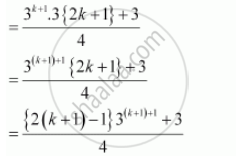Advertisements
Advertisements
प्रश्न
Prove the following by using the principle of mathematical induction for all n ∈ N:
उत्तर
Let the given statement be P(n), i.e.,


Thus, P(k + 1) is true whenever P(k) is true.
Hence, by the principle of mathematical induction, statement P(n) is true for all natural numbers i.e., n.
APPEARS IN
संबंधित प्रश्न
Prove the following by using the principle of mathematical induction for all n ∈ N:
`1^3 + 2^3 + 3^3 + ... + n^3 = ((n(n+1))/2)^2`
Prove the following by using the principle of mathematical induction for all n ∈ N:
Prove the following by using the principle of mathematical induction for all n ∈ N: `1/2 + 1/4 + 1/8 + ... + 1/2^n = 1 - 1/2^n`
Prove the following by using the principle of mathematical induction for all n ∈ N:
Prove the following by using the principle of mathematical induction for all n ∈ N:
Prove the following by using the principle of mathematical induction for all n ∈ N:
1 + 3 + 32 + ... + 3n−1 = \[\frac{3^n - 1}{2}\]
\[\frac{1}{1 . 2} + \frac{1}{2 . 3} + \frac{1}{3 . 4} + . . . + \frac{1}{n(n + 1)} = \frac{n}{n + 1}\]
1.2 + 2.22 + 3.23 + ... + n.2n = (n − 1) 2n+1+2
2 + 5 + 8 + 11 + ... + (3n − 1) = \[\frac{1}{2}n(3n + 1)\]
\[\frac{1}{2} + \frac{1}{4} + \frac{1}{8} + . . . + \frac{1}{2^n} = 1 - \frac{1}{2^n}\]
12 + 32 + 52 + ... + (2n − 1)2 = \[\frac{1}{3}n(4 n^2 - 1)\]
52n −1 is divisible by 24 for all n ∈ N.
32n+7 is divisible by 8 for all n ∈ N.
n(n + 1) (n + 5) is a multiple of 3 for all n ∈ N.
2.7n + 3.5n − 5 is divisible by 24 for all n ∈ N.
7 + 77 + 777 + ... + 777 \[{. . . . . . . . . . .}_{n - \text{ digits } } 7 = \frac{7}{81}( {10}^{n + 1} - 9n - 10)\]
Prove by method of induction, for all n ∈ N:
2 + 4 + 6 + ..... + 2n = n (n+1)
Prove by method of induction, for all n ∈ N:
`1/(1.3) + 1/(3.5) + 1/(5.7) + ... + 1/((2"n" - 1)(2"n" + 1)) = "n"/(2"n" + 1)`
Prove by method of induction, for all n ∈ N:
`1/(3.5) + 1/(5.7) + 1/(7.9) + ...` to n terms = `"n"/(3(2"n" + 3))`
Prove by method of induction, for all n ∈ N:
(24n−1) is divisible by 15
Prove by method of induction, for all n ∈ N:
`[(1, 2),(0, 1)]^"n" = [(1, 2"n"),(0, 1)]` ∀ n ∈ N
Answer the following:
Prove by method of induction 152n–1 + 1 is divisible by 16, for all n ∈ N.
Define the sequence a1, a2, a3 ... as follows:
a1 = 2, an = 5 an–1, for all natural numbers n ≥ 2.
Use the Principle of Mathematical Induction to show that the terms of the sequence satisfy the formula an = 2.5n–1 for all natural numbers.
Prove by induction that for all natural number n sinα + sin(α + β) + sin(α + 2β)+ ... + sin(α + (n – 1)β) = `(sin (alpha + (n - 1)/2 beta)sin((nbeta)/2))/(sin(beta/2))`
Show by the Principle of Mathematical Induction that the sum Sn of the n term of the series 12 + 2 × 22 + 32 + 2 × 42 + 52 + 2 × 62 ... is given by
Sn = `{{:((n(n + 1)^2)/2",", "if n is even"),((n^2(n + 1))/2",", "if n is odd"):}`
Prove the statement by using the Principle of Mathematical Induction:
For any natural number n, 7n – 2n is divisible by 5.
Prove the statement by using the Principle of Mathematical Induction:
n(n2 + 5) is divisible by 6, for each natural number n.
Prove that number of subsets of a set containing n distinct elements is 2n, for all n ∈ N.
State whether the following statement is true or false. Justify.
Let P(n) be a statement and let P(k) ⇒ P(k + 1), for some natural number k, then P(n) is true for all n ∈ N.
